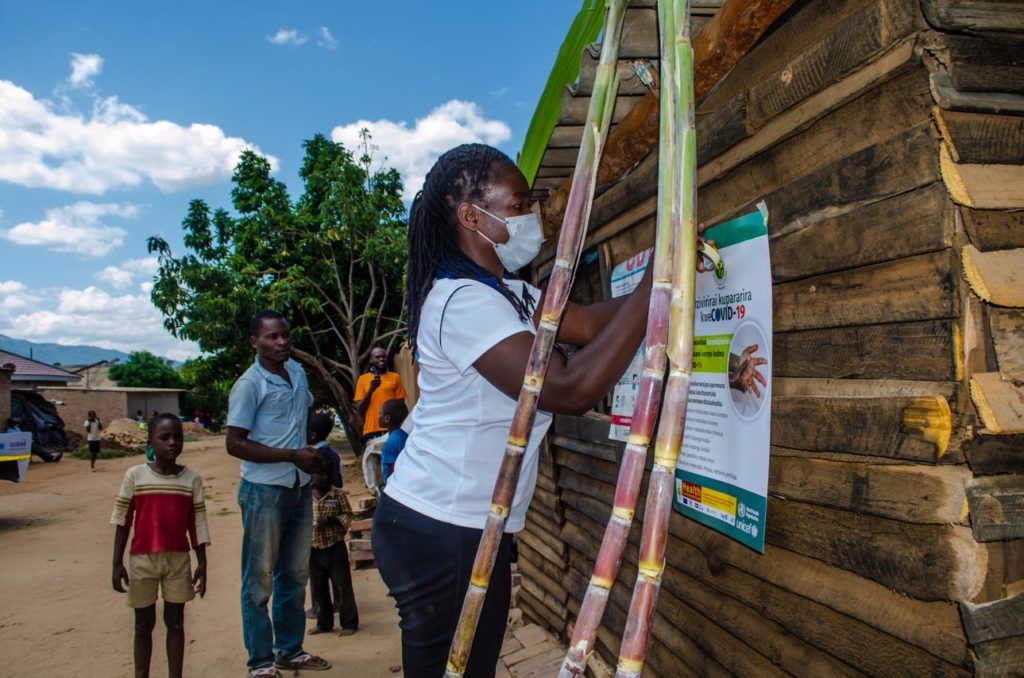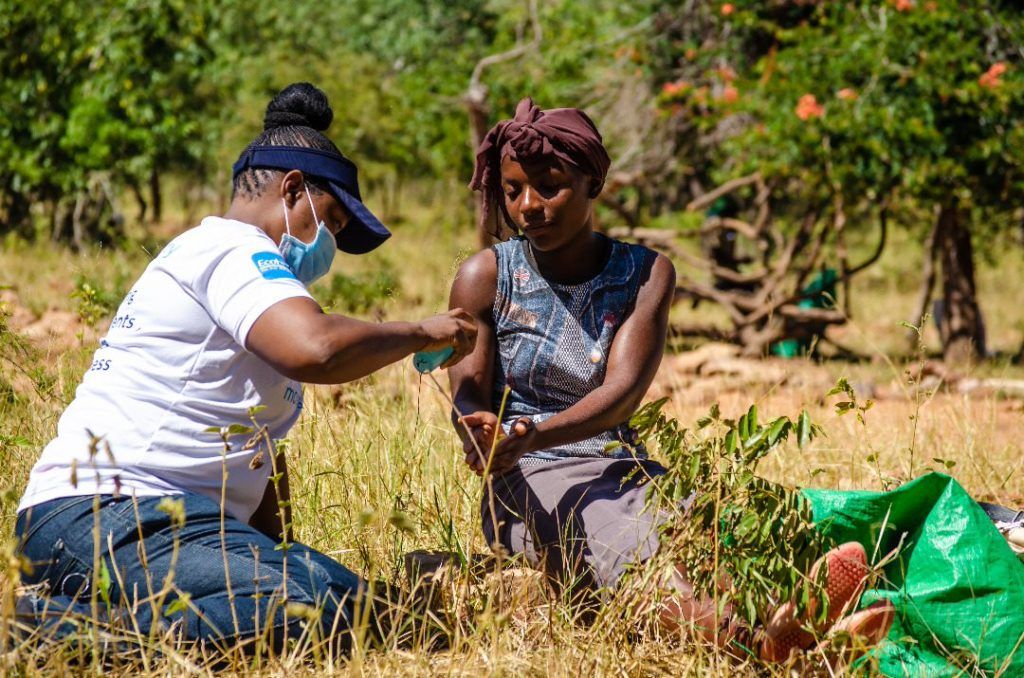May 20, 2020 • 6 min read
In the first of our ‘GOAL on the Ground’ series, Kevin Naughton looks at how GOAL is helping vulnerable communities fight the spread of Covid-19 in Zimbabwe
Zimbabwe has 46 confirmed COVID-19 cases and 4 deaths since the crisis began. To date GOAL has reached more than 6 million people with COVID-19 supports – more than 4.5 million with awareness messaging through national radio ads, food distribution, support with WASH, and sharing gender based violence information and 1.2 million people using a mobile unit campaign. In addition GOAL Zimbabwe has been training community volunteers in its Community-Led Action approach that puts communities at the centre of preventing the spread of COVID -19.
The challenges
Zimbabwe is a country already in crisis coping with the aftermath of Cyclone Idai, ongoing drought and spiralling inflation. Cyclone Idai wreaked havoc on the country in March 2019. Thousands lost their homes and millions of euros worth of damage was caused to infrastructure and crops. In addition to this, Zimbabwe has been plagued by economic challenges for many years and as a result suffers from hyperinflation making the most basic commodities unaffordable by the majority of the population.
GOAL’s COVID-19 actions in Zimbabwe
Information Campaign
With local restrictions and social distancing in place across the country, our GOAL Zimbabwe team has been reaching communities in new ways. The dissemination of health information has been the focus of activities using national radio ads and a mobile unit information campaign.

Promobile remote messaging van in Zimbabwe.
GOAL has been working with a local outdoor advertising and marketing company, Promobile Africa, with mobile units travelling to rural communities to give people information on COVID awareness and prevention, such as importance of social distancing, masks wearing and regular hand washing. Those rural communities do not have access to traditional media. These messaging campaigns have reached over 1.2 million people in the capital Harare and in Mutare, Chipinge District in Manicaland Province and in Mashonaland East Province.
This campaign is primarily targeting beneficiaries of the Lean Season Assistance food aid programme that GOAL implements in partnership with WFP, providing food aid to over 340,000 people a month. The campaign has been highly effective and very well accepted by the communities. In addition to this our mobile teams have been putting up posters in public places as well as demonstrating hand washing. This campaign has been supported by Irish Aid, UNICEF and the Zimbabwe Idai Recovery Project.
GOAL has also partnered with the Ministry for Health, Irish Aid and UNICEF on a national radio information campaign. These broadcasts have reached over 4.5 million people. Similar to the mobile units, these messaging campaigns are essential in informing people how to best protect themselves from the virus. The messages centre around washing hands regularly, practicing social distancing and using face masks.
.@GOALZimbabwe, in partnership with the Ministry of Health, @Irish_Aid and @UNICEF, is broadcasting a radio campaign explaining the importance and correct use of #facemasks by the public. pic.twitter.com/YQedIXntVO
— GOAL Global (@GOAL_Global) May 19, 2020
Gender Based Violence
With families under strain and confined to close quarters with one another, tensions can run high. As in other parts of the world during the COVID-19 crisis Gender based violence (GBV) has increased across Zimbabwe.
According to Musasa, an agency that runs toll free GBV help lines, there has been a 100% increase in calls related to domestic abuse since the start of lockdown. GOAL Zimbabwe Country Director, Gabriella Prandini, says: “We are very concerned that there may be as many unreported cases. Once lockdown is lifted life for most Zimbabweans will go back to a life of increased hardship, and the added worry of a pandemic that might engulf their community and families.”
As part of GOAL Zimbabwe’s work to keep communities safe our COVID-19 campaign messaging also includes key messages on GBV and child protection. Risks have increased because critical GBV and child protection services are not readily available to the public. GOAL Zimbabwe’s intervention involves distributing key information to the community on the need for men, women and children experiencing violence to report cases, and providing hotline numbers of key GBV, child protection, legal services organisations who can assist with relevant referrals.
“We saw on our phones so many dead bodies and coffins in Italy.”
“I am appealing to Zimbabweans – the virus is here so let’s stay at home.”
Residents in Harare are responding to the #Covid19 crisis pic.twitter.com/kfQuvtfJzw
— GOAL Global (@GOAL_Global) May 22, 2020
Water, Adequate Sanitation, and improved Hygiene (WASH)
GOAL is working with UNICEF on a programme to help communities improve their access to water. Limited access to clean running water is a huge problem for many communities in Zimbabwe who GOAL work with. Lack of access to running water means people must travel long distances to collect water from the few public boreholes. This causes issues with crowding at water sources and makes self-isolation impossible for many people.
Food Security
Zimbabwe is already suffering from critical food shortages, due to Cyclone Idai which hit in 2019, and ongoing drought. Last year GOAL supported over 800,000 people with food across the country.
Lockdown restrictions have limited peoples access to income and food. Many Zimbabweans make their livelihood informally, often working at markets which have now been closed.

Food distribution in Zimbabwe
To combat malnutrition, GOAL – in partnership with ECHO (European Civil Protection and Humanitarian Aid Operation), has initiated a nutrition programme primarily aimed at children aged 6-59 months. This initiative will help health facilities and the community identify children suffering from Severe Acute Malnutrition (SAM) and Moderate Acute Malnutrition (MAM).
Mothers will receive training on how to measure their children’s mid-upper arm circumference to establish if they are suffering from malnutrition. At community level children will be referred to the nearest health facility. Through this initiative GOAL will support training of nurses and village health workers on CMAM (Community Based Management of Malnutrition).
This initiative will also supply families suffering with malnutrition with super cereals. GOAL is establishing warehouses in two provinces and will deliver directly to health facilities. A total of 7,773 children suffering from malnutrition will receive rations in six districts being targeted.
.@GoalZimbabwe teams are on the ground tackling the spread of #Covid19 pic.twitter.com/IMCeRg7oyV
— GOAL Global (@GOAL_Global) May 22, 2020
Community-Led Action Approach (CLA)
CLA is a community centered approach successfully used by GOAL during the Ebola epidemic in Sierra Leone in 2014. It puts communities at the centre of efforts to prevent the spread of COVID -19. In Zimbabwe GOAL is training volunteers to lead communities in dialogue about how to stop the spread of Covid-19. These community conversations give the local people the knowledge to help themselves and is an essential long-term strategy to prevent a further spread of the disease. CLA effectively worked in the cholera outbreak in Harare and is also being used in the response to Cyclone Idai in Chimanimani District.
The CLA approach is the bedrock of our campaign to combat the spread of Covid-19 in Zimbabwe and our other countries of operations.


